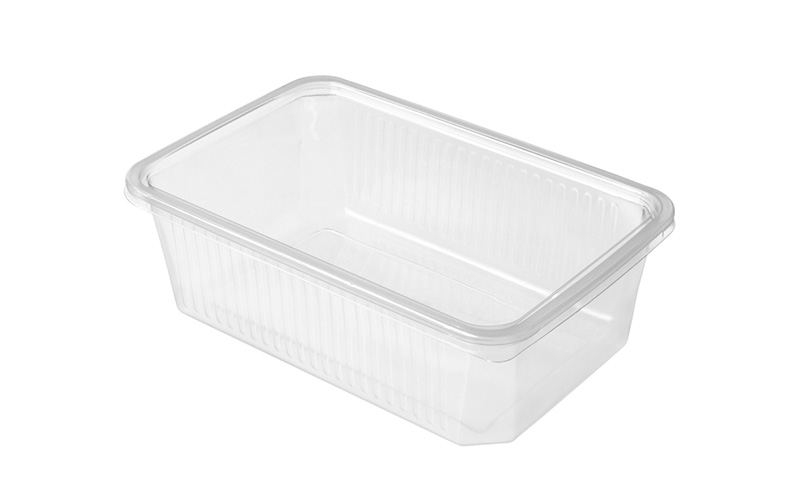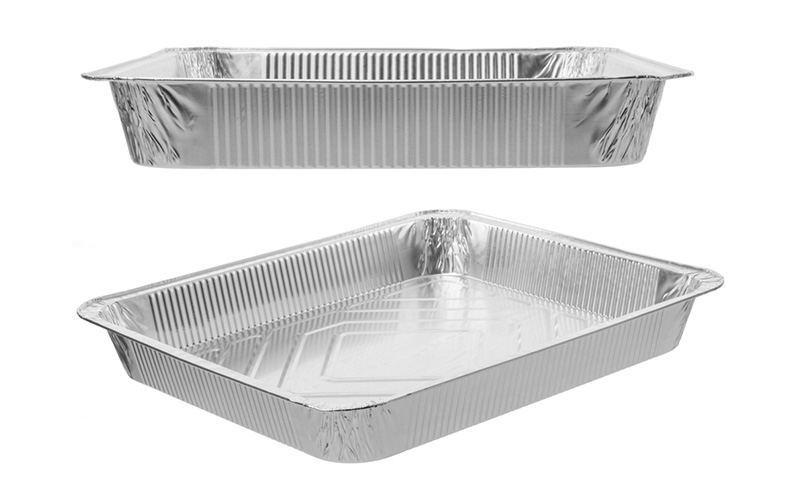
Clear Food Containers vs. Aluminum Foil Pans: Which is Better for Food Storage?
Clear food containers and aluminum foil pans both serve the purpose of food storage, but they come with different advantages and disadvantages. Which one is better for you largely depends on the specific needs of the situation. Let's break down some of the pros and cons of each:
Clear Food Containers

Pros
- Visibility: The transparent nature of these containers allows you to easily see the contents, which can help in identifying food without having to open the container.
- Reusable: Many clear food containers are designed to be reused multiple times, reducing waste.
- Microwave Safe: Some plastic containers are microwave safe, allowing for easy reheating. However, always check the manufacturer's instructions first.
- Stackability: They usually come with a uniform shape that allows for easy stacking and efficient space usage in the fridge or pantry.
- Sealing: Many clear containers come with tight-sealing lids which can help in preserving the freshness of food.
Cons
- Durability: While there are robust clear containers available, some can crack or break upon impact.
- Heat Sensitivity: Some plastic containers may warp or release chemicals when exposed to heat, so always ensure they're heat-safe before use.
- Staining & Odor: Some types of plastic can retain odors and get stained, especially from foods like tomato sauce.
Aluminum Foil Pans

Pros
- Heat Conductivity: Aluminum is a good conductor of heat, making these pans suitable for baking and cooking.
- Disposable: If you're catering or bringing dishes to events where you don't want to carry containers back, disposable aluminum pans are convenient.
- Freezer Safe: These pans are excellent for storing foods in the freezer.
- No Staining & Odor: Unlike some plastics, aluminum doesn’t retain food odors or stains.
Cons
- Not Transparent: You can't see the contents without removing the cover.
- Not Always Resealable: While some aluminum pans come with lids, they don’t always create a tight seal, which can allow for air exchange.
- Environmental Concerns: While aluminum is recyclable, disposable pans can contribute to waste if not properly recycled.
- Malleability: Aluminum foil pans can be easily bent or punctured.
- Reactivity: Aluminum can react with acidic or alkaline foods, which might affect taste and can lead to the pan degrading.
Specific Considerations
When choosing between clear food containers and aluminum foil pans, consider the following:
Storage Duration
- For short-term, disposable use, aluminum foil pans may be preferable.
- For long-term storage, especially of leftovers, clear containers with airtight lids can help preserve food quality.
Type of Food
- Clear containers may be preferable for storing soups or liquids due to their sealing capabilities.
- Aluminum pans may be more suitable for solid food items or baked goods.
Cooking Needs
- If you plan to cook or reheat the food in an oven, aluminum pans are generally more suitable.
- For microwaving, you'll need microwave-safe clear containers.
Environmental Impact
- Consider the environmental footprint; reusable containers usually have less environmental impact over time compared to disposable aluminum pans.
- If you choose aluminum pans, try to recycle them to minimize waste.
Portability
- Aluminum foil pans can be more convenient for transporting food to potlucks or gatherings as they are lightweight and disposable.
- Clear containers can be bulky and heavier, but they may have a more secure seal, reducing the risk of spills during transport.
Health And Safety
- When using clear plastic containers, ensure they are free of harmful chemicals like BPA, especially when using them to store hot food or when microwaving.
- When using aluminum foil pans, avoid storing highly acidic or alkaline foods to prevent reactions with the metal.
Strategic Utilization
To maximize the benefits of both clear food containers and aluminum foil pans, you could strategically use them in different scenarios:
Daily Meal Preps and Leftovers
Use clear containers for daily meal prep and leftovers. They are typically more practical for everyday use, enabling you to see the contents easily and access them conveniently.
Baking And Cooking
Aluminum pans are your friend when it comes to baking or preparing dishes in the oven, eliminating the hassle of transferring food to another dish before cooking.
Outdoor Events Or Potlucks
When attending an event where retrieving your container might be inconvenient, opt for aluminum foil pans.
Freezing
Utilize both depending on the food. Aluminum is excellent for freezing baked goods, while clear containers with airtight lids are great for freezing soups, stews, and cooked meals.
Portion Control And Diet
Clear containers often come in varying sizes, allowing for easy portion control, essential for those on specific diet plans.
Practical Tips
- Labeling: Whether using clear containers or aluminum foil pans, labeling the contents, especially if they are going in the freezer, can help identify them later and keep track of expiration dates.
- Proper Sealing: Ensure that the containers or pans are properly sealed to avoid spillage and preserve the food's freshness.
- Regular Cleaning and Inspection: Regularly clean clear containers and inspect them for any damage. Discard any that are cracked, heavily stained, or have a lingering odor.
- Recycling: Be mindful of the environmental impact and try to recycle aluminum pans and plastic containers when they have reached the end of their life.
- Invest in Quality: Whether choosing clear containers or aluminum pans, investing in quality products can enhance food safety and potentially save money in the long run by reducing the need for replacements.
Frequently Asked Questions
Can I Use Aluminum Foil Pans In The Microwave?
No, aluminum foil pans should not be used in the microwave as they can cause sparks and potentially damage the appliance. Use microwave-safe containers instead.
Can Clear Food Containers Be Used In The Freezer?
Yes, many clear food containers are freezer-safe, but always check the manufacturer's guidelines to ensure they won't crack or become damaged at low temperatures.
Do Aluminum Foil Pans React With Acidic Foods?
Yes, aluminum can react with acidic or alkaline foods, potentially altering the taste and causing the pan to degrade, so it's best to avoid storing such foods in aluminum pans.
How Can I Remove Stains And Odors From Clear Food Containers?
To remove stains, use a mixture of baking soda and water to scrub the container gently. For odors, letting the container sit with crumpled newspaper or coffee grounds inside can help.
Conclusion
The integration of both clear food containers and aluminum foil pans, applied appropriately in different circumstances, will allow you to leverage the advantages of both, leading to efficient and versatile food storage solutions. By understanding your food storage needs, whether short-term convenience or long-term preservation, you can select the right storage method to fit the situation and make your kitchen endeavors more enjoyable and effective.


